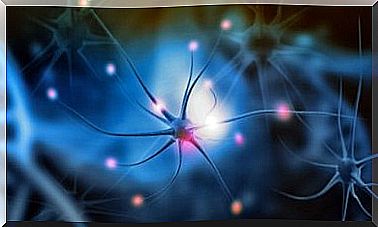Our Skin Does Not Suffer From Alzheimer’s, But Remembers All Caresses And Cruelty Forever

It is quite common to mistakenly believe that people suffering from Alzheimer’s disease or other memory disorders generally lose contact with the outside world, and disappear into their own distant and unreal inner world. This image does not really correspond to reality very well.
And if we allow ourselves to think that a person with Alzheimer’s, for example, is no longer the same as before, he will lose his own identity in the eyes of society. The almost automatic natural consequence of this, in turn, is that his own feelings lose all their value.
By putting yourself in the shoes of a person with dementia, you will find that it is perfectly normal for him or her to experience fear surrounded by the perseverance of everyone else and not really know how to express what he or she feels or needs. He when he doesn’t necessarily understand what other people are saying to him, or he doesn’t recognize the people who are lurking around him on a daily basis, let alone necessarily understand what other people might be expecting from him at any given moment.
We will rarely put ourselves in the position of carrying burdens like Alzheimer’s. But as we do this, we will soon realize how creepy and stressful everyday life can be for them. In addition, we can then properly understand anxiety and other emotional reactions that, from our own “ healthy ” perspective, often seem exaggerated.

Validation is a method of individual-centered therapy
Over the past decade, care and communication have slowly returned to an individual-centered model. Such therapeutic and relational models are important for Alzheimer’s sufferers to have a better chance of ending up in an environment that provides the necessary validation and stimulates them.
In practice, this means trying to understand a person with dementia, thus maintaining their identity and helping them to form an understanding attitude towards the “changed behavior” that makes caregivers and people feel a little or more uncomfortable with them.
Researchers recommending this model of care have underlined the need to maintain a fundamental sense of self-worth in all people. Therefore, we need to use empathy as our help to settle on the right frequency to understand the inner reality of a person with dementia.
The goal is to provide them with security and strength. In this way, they can feel that they have become validated and are able to express their own thoughts. For only when an individual can begin to re-express himself can he regain his self-esteem.
Why? Because his validation means recognizing his emotions. Validation means communicating to him that his feelings are right. If, in turn, you reject these feelings, you reject that person and destroy his or her identity. At the same time, doing this creates a huge emotional level gap.

Essential principles of the validation method
So let’s get acquainted with some of the essential principles of this method:
- A person is accepted without conviction (Carl Rogers).
- He is treated like a unique person (Abraham Maslow).
- Any emotion he expresses that is recognized and validated by someone he trusts loses some of his power. When we ignore or reject these emotions, they intensify. “A neglected cat turns into a tiger” (Carl Jung).
- Every human individual is valuable, no matter how lost he or she is (Naomi Feil).
- When their local memory fails, we can help them stay in balance by recalling recent memories. When their vision begins to deceive, they can use their eye to see. And when their hearing deceives, they listen to the voices of the past (Wiler Penfield).
People with Alzheimer’s or some other form of dementia need a new connection to the outside world
One Disney-Pixar-produced film, Coco, is a truly stunning and emotional example of how a person with Alzheimer’s can be reconnected, and how their skin and deepest emotions can be touched again. This is exactly what happens in a scene where the song “Remember Me” provides a wonderfully sweet nuance to the description of the emotional connection that its melodies evoke in the film.
Just because someone loses their ability to express things verbally doesn’t mean they still have a need to express themselves. This is why it is so paramount to pay attention to people who suffer from challenges such as memory disorders. We need to connect with their moods and dive into those same feelings without blurring.
Concetta M. Tomaino (2000) said that “It is always surprising to see a person who is completely closed and alienated from the world due to Alzheimer’s disease or other similar illness return to life when someone plays a song they are familiar with. His reaction can range from a slight change in posture to eager movement. The reaction can be more than sounds and even reach verbal responses. ”
In addition, some kind of reaction almost always follows, as well as interaction. In many cases, these reactions may appear delusional. But they can still really reveal a lot about how people always keep such little parts of themselves. Moreover, this is a great reminder that those struggling with the functioning of their memory are still able to bring their own personal memories to life with the power of their minds.








